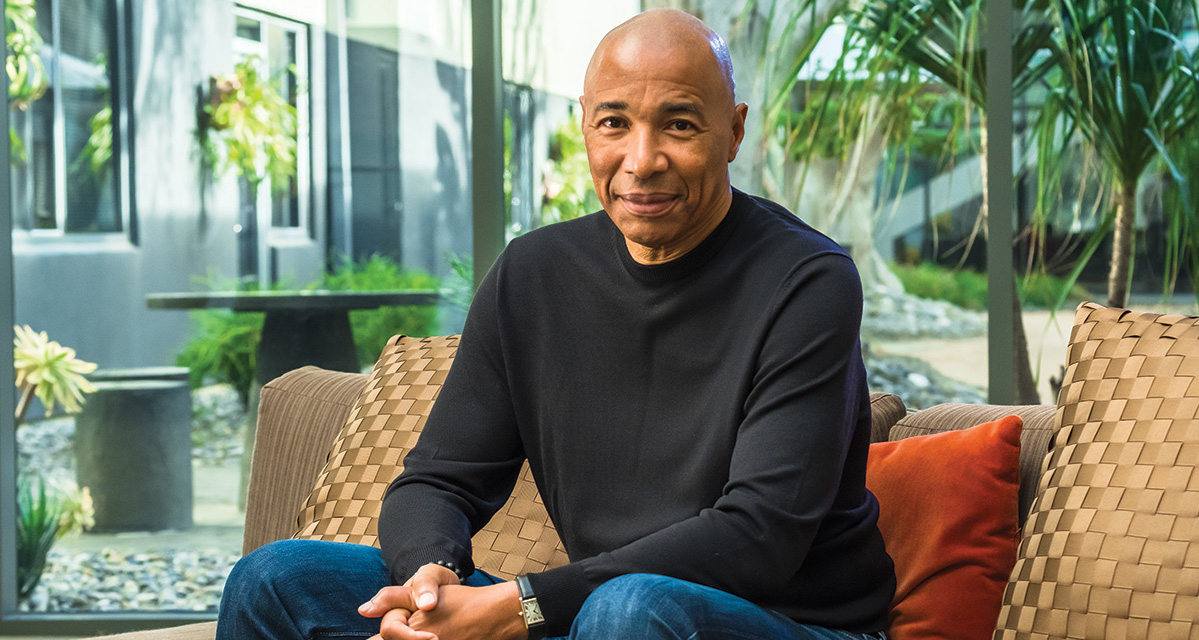by Debra Kaufman • portraits by Wm. Stetz
The editing career of Monty DeGraff has been in sync with some of television’s cultural icons. Starting off with his first editing credit, cutting a 1989 episode of Star Trek: The Next Generation (1987-1994), followed by five early episodes of Melrose Place (1992-1999) as an assistant editor, he went on to edit throughout five seasons of Law & Order (1990-2010), nine episodes of Daredevil (2015-present), and now several yet-to-air installments of Amazon Studios’ The Man in the High Castle (2015-present) and the pilot of the much-anticipated upcoming ABC sci-fi thriller The Crossing (2018).
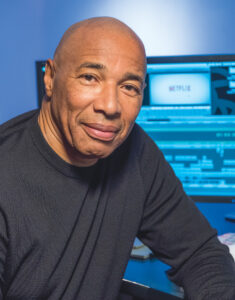
Monty DeGraff.
Photo by Wm. Stetz
From his first film job as an apprentice on the lot of Lorimar (the studio that brought us such mainstays as The Waltons, Dallas and Falcon Crest), to the golden age of original streaming content, DeGraff has achieved his goal in the field. “What I really wanted was experience cutting lots of different types of shows, and get to work with the very best material on the most compelling shows,” he says.
ABC’s The Crossing, which is set to premiere April 2, is a high-concept story that some have compared to Lost: A town becomes a haven for war refugees escaping an event 250 years in the future, ultimately revealing a conspiracy. DeGraff said the pilot came to him through ABC post-production executive Paul Rabwin, with whom he worked on the 2005 miniseries Revelations. “He convinced the producers to meet me, and they did in fact hire me,” DeGraff relates.
Although he doesn’t want to reveal too much about The Crossing, DeGraff says the pilot’s opening scene takes place under water. “They did a lot of shooting in a water tank in Vancouver,” he says. “It’s a phenomenally beautiful shot and such a strong piece, it pulls you in for the rest of the episode. I think all of us who worked on it are really proud of it. It was a rare project where, even in the middle, we felt the show was going to be picked up.”
The pilot, he recounts, was “one of the smoothest” he’s worked on, in part because of his assistants, Greg Sirota and Kaylee Koenig, along with music editor Amber Funk. “Greg was my first assistant and took control of everything that came into the cutting room,” says DeGraff.
He also played a role in advancing Sirota’s career. “Greg was very experienced,” he reveals. “He couldn’t figure out how to make the leap to editor, so at the end of the pilot process, when it was assured the pilot would be picked up, I spoke with the producers and convinced them they could take a chance on Greg. He got picked up as an editor and he’s thriving. There’s nothing more exciting than seeing someone do really good work and become a peer.”
“I’ve had many assistants with whom I have never developed a relationship, but when an assistant says, ‘I’d like to stay with you on a number of projects and have you help me become an editor,’ I take that relationship very seriously.”
Mentoring younger editors has become an important focus for DeGraff. When he was editing City of Angels (2000-present), he had his first experience mentoring an assistant, Kelley Dixon (now ACE). “First of all, she was African American and it was startling to me how she got there,” the editor concedes. “She was also a tremendously talented sound editor and made my cuts look good. She and I also did Bull [2000-present] and Revelations together, and we could talk about what we were doing.” Dixon went on to edit Breaking Bad (2008-2013), Shameless (2011-present) and The Walking Dead (2010-present), among other shows.
Knowing more about DeGraff’s own path to becoming an editor helps clarify why mentoring is so important to him today. New York-born and raised, he was a history major at the University of Rochester. After graduation, he was torn between law school and a career in film and television. A friend’s mother worked at Paramount and found him an opening as an NBC page, and the decision was made.

The Crossing.
ABC
The page job led to an opening in the post-production department where DeGraff found work as an apprentice editor. “Once I was in the union, I got a job at Lorimar, which was inside a studio, on the old MGM lot [now Sony],” he recalls. “They had an army of editors, assistants and apprentices, all in film.” That gig got him on the Editors Guild roster, and his first job as ACE editor Tom Benko’s assistant on MacGyver (1985-1992). When Benko got the call to do the pilot for Star Trek: The Next Generation, he asked his assistant to join him there. Two seasons later, DeGraff recounts, he asked executive producer Rick Berman for a chance to edit an episode. “He said that if Tom was okay with it, so was he,” recounts DeGraff, who then became an editor.
For the next few years, DeGraff “bounced back and forth” between editing and assisting. Then he got on a Dick Wolf show, New York Undercover (1994-1999), which led to his stint on Law & Order. “That was the single most important happening in my career, outside of the initial editing credit on Star Trek,” the editor attests. “Law & Order was critically acclaimed and it allowed me to reach out to other producers.” After Law & Order, DeGraff considers his work on Netflix’s Daredevil to be another big leap forward. “It was an extremely well-shot show that had a lot of very complex, challenging fight scenes,” he continues. “When you meet a challenge like that, you grow.”
DeGraff notes that, in addition to his breakthrough projects, the craft of editing TV dramas has changed in the last 15 years with the increased amount of footage. “Single-camera is a misnomer,” he says. “It’s almost always multi-camera and, especially for cable and streaming shows, we’re dealing with 50 minutes for the final product, as opposed to network, which is 42 minutes. That eight minutes is a lot. One-and-a-half hours of dailies became three or four.
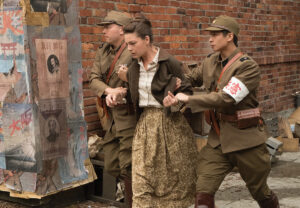
The Man in the High Castle.
Amazon Studios
“Those editors who could handle the complexity thrived,” he continues. “Everyone found their own way of how to really own the material and not get bogged down by it.” Young assistants, he adds, aren’t intimidated by the footage since they see their editors doing it on a daily basis.
The increased footage had an unexpected impact. “When you’re shooting multiple takes from several cameras, it puts a lot of weight on the editors to be the repository of knowledge about that footage,” DeGraff stresses. “It made me eventually stop second-guessing what the directors or producers would want — not to ignore their vision, but I started to have confidence that if I could satisfy myself, I could satisfy everyone else.”
Throughout that period of time when DeGraff was getting his footing as an editor, he had no mentors. “A number of editors helped me by rehiring me, but I didn’t have those editors who actually critiqued my work and showed me how they were doing what they were doing,” he says. “So I had to find my own way.” Part of that was due to the nature of television post-production, where assistants are often hired separately from editors, unlike the close relationship that often develops between an editor and assistant in the feature film world.
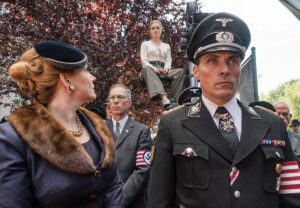
The Man in the High Castle.
Amazon Studios
DeGraff didn’t even consciously consider himself to be a mentor when he first started helping Dixon. “She was the first person that made me think that I had something real to offer young editors in terms of my experience,” he says. He says he prefers if the assistant approaches him for mentoring. “That shows an openness and a hunger to learn from my experience,” he says. “I’ve had many assistants with whom I have never developed a relationship, but when an assistant says, ‘I’d like to stay with you on a number of projects and have you help me become an editor,’ I take that relationship very seriously.”
When he was editing the Netflix horror show Hemlock Grove (2013-2015), assistant Damien Smith approached him. “He asked to stay with me for a couple of shows, so he could grow to be an editor,” says DeGraff. “He had a tremendous amount of background in sound work and was already a talented editor. He assisted me on the second season of Daredevil and the pilot of Designated Survivor (2016-present), and showed producers he could cut scenes, and they bumped him up to editor this season.”
The editor’s most recent mentee is Koenig, who assisted him on The Crossing pilot. When DeGraff moved over to The Man in the High Castle, she reached out and asked if he was looking for an assistant. “I felt like I had a lot to learn from him,” she recalls. “He said, ‘Absolutely.’” The experience, according to Koenig, has been transformative. “Right away, he had me practice cutting scenes, including scenes that were very difficult,” she adds. “He gave notes like a director would, in a way that shows he didn’t dislike the choice but that another, better one could be made.”
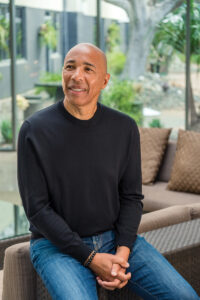
Monty DeGraff. Photo by Wm. Stetz
DeGraff also encouraged her not to be afraid to speak up. “He said, ‘You have good opinions and thoughts, and to sit in the room and not speak them isn’t doing the project a service,’” she remembers. “I found my voice and learned to have confidence in my own abilities — that people will believe me if I believe in myself.”
Mentoring is a two-way street, DeGraff notes. “I am constantly learning from my assistants new short cuts and ways of using the Avid more effectively,” he reveals. “They learn from their peers and the other editors they work with, and pass it along.” Working with mentees has had another impact on him: “The commitment has really deepened for me. It has given me a lot more confidence in my own editing. A lot of the process of editing isn’t something we articulate to ourselves. [Having to do so] has deepened my understanding of my own process and helped me as an editor.”
Mentoring Guild assistants has another important facet. “During an open Editors Guild meeting last fall, it became apparent that many young editors are not aware of — or passing on — the protections and benefits of union membership to their assistants,” says DeGraff. “The culture of knowledge of our bargained-for rights is slowly eroding. It’s the editors’ duty to help their assistants know their rights.” The Guild, he adds, is also “aware of this reality and is working to turn it around.”
When DeGraff started in the business, there were seven African Americans in the organization. “Now there are a large number of African-American assistants,” he says. The editor has been happy to mentor any assistant who asks for help, but his work with the Guild’s African-American Steering Committee, and his awareness of women editors’ issues, through the Women’s Steering Committee (both sub-committees of the Guild’s Diversity Committee) has honed his focus. “I’m not opposed to mentoring whoever comes across my path,” he adds. “But I’ll be especially on the lookout for talented assistants who are women or people of color.”
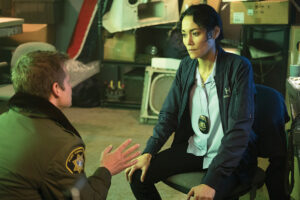
The Crossing.
ABC
DeGraff notes that encouraging both women and African-American union members is crucial. “Often we are in our cutting rooms and isolated from one another,” he explains. “One of the biggest challenges is simply knowing that there are others like you to whom you can turn for support and information. It serves primarily as an opportunity for us to know who’s out there, but also an opportunity to help someone who may encounter a challenge for the first time. Talking with someone else who has encountered that challenge is a way to go forward.
“There are so many African-American assistants out there who are hungry for solid information on how you find your support team,” he continues. “Everyone has to create that for her or himself. For some things, someone needs to show you the ropes. A lot of that takes place in the steering committee.” The committee also plans to celebrate successful members as “way-showers” for those assistants. “We all take great pleasure and joy in each other’s success,” says DeGraff, noting that editor James Wilcox recently won the ACE Eddie Award in the Best Edited Miniseries or Motion Picture for Television for the pilot episode of Genius (2017).
DeGraff has already started work on Netflix’s Narcos (2015-present), and the production has assigned him an assistant, who he will doubtlessly be open to mentor. “I’ll be doing two episodes over the next six months,” he says. “They’re mini-movies, with very dense storytelling in terms of imagery and sound. I’m really looking forward to that.”


